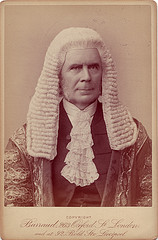 Free Speech
Free Speech
Would Academic Freedom in Tennessee Survive Legal Challenge?
Writing at scienceblogs.com, in partnership with National Geographic, Josh Rosenau covers an expansive beat. Serving in his spare time as an official with the Darwin-lobbying National Center for Science Education, the prolific Rosenau has written recently about Citizens United, Thomas Jefferson’s religious views, and religious objections to the HHS mandate, among other scientific matters. Such blogging is, of course, the most natural and profitable application of Rosenau’s formal training in evolutionary biology. Indeed, because Rosenau studied the phallic morphology of Philippine rodents, which bears closely on matters of state education policy, it was unsurprising he would use NatGeo’s scienceblogs.com to hold forth on the new academic freedom law in Tennessee, and even predict its downfall.
Such blogging is, of course, the most natural and profitable application of Rosenau’s formal training in evolutionary biology. Indeed, because Rosenau studied the phallic morphology of Philippine rodents, which bears closely on matters of state education policy, it was unsurprising he would use NatGeo’s scienceblogs.com to hold forth on the new academic freedom law in Tennessee, and even predict its downfall.
In a test of reader patience, Rosenau dedicates the first 1255 words of his post to a potpourri of subjects including Casey Luskin, Media Matters, and the legal row over creationism in the 1980s. Although he could have just as easily turned next to the subject of Alf, Wham!, or the A-Team, Rosenau instead quantum leaps back to the future to discuss more timely matters:
[T]he Tennessee Monkey Bill’s legislative history shows its advocates focusing on evolution in the same way that creationists in Louisiana and Arkansas did, and that members of the public testifying in the bill’s favor included an officer of a local creationist society and others who invoked Genesis and Sunday school lesson, and that the state teachers’ association again objected that the law gave teachers no new powers, [so] it won’t be hard for courts to reach the same conclusion about this bill that they have about previous creationist bills. [Emphasis added.]
Rosenau’s main point is that the new academic freedom law is already in big trouble, for upon inevitable legal challenge it will easily be struck down as a violation of the Establishment Clause. That is the part of the U.S. Constitution which bars lawmakers and other agents of the state from endorsing a particular religious view. To generate this scientific prediction, Rosenau first gazes into the oracle of the Tennessee law’s legislative history, the relevant record of statements and other material on which lawmakers relied to make the law.
In that record, Rosenau “sees” the forces of religion (creationism, specifically) quietly — even deceptively — at work to produce a law meant to unconstitutionally promote religion, a law that by design subtly urges public school teachers to teach creationism, or something similarly religious, while signaling to courts just the opposite by way of a “no religion” disclaimer in the text of the law, or so the story goes. In view of the academic freedom law’s “creationist” legislative history, which a reviewing court may use to go behind the text of the law to see what it is “really” about, the academic freedom law’s “no religion” disclaimer “will be [held] irrelevant,” says Rosenau, just as it was in the creationist past.
In this same spirit, Rosenau continues:
Indeed, the fact that the Discovery Institute model legislation includes such a disclaimer is a red flag. Most bills don’t include such efforts to hide their agenda from courts — the bill’s intent speaks for itself. Saying “This bill isn’t unconstitutional” should just draw greater scrutiny from legislators …
After which he finally concludes:
The Monkey Bill claims not to protect the teaching of religious doctrines, but so did previous laws that explicitly stated their goal as teaching creationism, so how much credibility should we even give that?
Now, this is some solid science blogging, of which NatGeo should be proud. However, a few corrections are in order:
First, there is no such thing as a “Monkey Bill.” Rosenau’s use of the phrase in the present tense suggests confusion over what actually happened in the Tennessee legislature. Here’s what happened.
Earlier this year, two companion bills on academic freedom were introduced at roughly the same time, one in the House, one in the Senate. For reasons I’ll leave out, an amended version of the House bill became an academic freedom law, whereas the Senate version of the same was ultimately set aside. Once that happened, the academic freedom bills, original and amended, became part of the legislative history of the academic freedom law; indeed, they became the most important part of that history, at least for the purpose of judicial interpretation, should that ever become necessary. But, to be clear, a bill is not a law, as Schoolhoue Rock! taught us long ago. So, to be charitable, by “Monkey Bill” Rosenau must mean “Monkey Law.”
to be charitable, by “Monkey Bill” Rosenau must mean “Monkey Law.”
Second, there is nothing “Monkey”-related about Tennessee’s academic freedom law. True, the famous Scopes “Monkey Trial” also took place in Tennessee, but with nearly a century separating the two, the similarities start and end with geography. Of course, Rosenau’s aim as a science-blogging evolutionary biologist is not to make descriptively accurate comparisons so much as it is to tar good law with symbols of the bad.
Third, and most importantly, there is some confusion over what legislative history is, is not, and what it’s properly used to do. It is, again, the record of what legislators relied on to make law. It does not include the religious or non-religious expressions and affiliations of members of the public, not even those who testify as experts on a bill that eventually becomes law, unless lawmakers rely on that testimony to make law. The public could line up single file outside the statehouse and read, one after another, straight from the 1611 King James Bible into the public record at a House education committee hearing yet even that wouldn’t invalidate the legislative product of the hearing.
That’s because the U.S. Constitution only governs state action, which is primarily what state employees and state partners do, and why. Courts may, on occasion, use legislative history to discern this “why.” They use legislative history, that is, to discern from time to time lawmaker intent(s) behind the text of a state or federal statute, Constitutional provision or administrative regulation when, e.g., the “plain meaning” of the text is not so plain, when it does not clearly “speak for itself,” when poor, ambiguous drafting generates legal controversy, etc.
But even when there’s textual ambiguity, judicial use of legislative history is controversial, as the activity is essentially unconstrained. Most judges avoid controversy, especially political controversy. It is part of the temperament and job description. Yet reading legislative history is often like “looking over a crowd and picking your friends,” according to Judge Leventhal, which is, of course, a controversial (i.e,. bad) thing for a judge to do.  This is to say that there are no authoritative and binding rules (judges like to operate within such rules) to govern judicial use of legislative history. Even if there were, the second set of rules won’t read and apply themselves, which is to say they too must be interpreted. That would in turn direct the judicial reader to the history of the second set of rules, so on and so forth.
This is to say that there are no authoritative and binding rules (judges like to operate within such rules) to govern judicial use of legislative history. Even if there were, the second set of rules won’t read and apply themselves, which is to say they too must be interpreted. That would in turn direct the judicial reader to the history of the second set of rules, so on and so forth.
If legislative history is not tethered close to the face of the final legislative product, the text of the law, it quickly becomes turtles all the way down, that is. Better, say some jurists, to avoid gazing long into it in the first place, and instead decide cases on firmer, less arbitrary grounds.
Despite Rosenau’s prediction, courts don’t lightly or easily invalidate as unconstitutional all uses or applications of a statute. That is, they don’t like to hold a statute like the one in Tennessee completely unenforceable in all conceivable situations and thereby strike it down as facially invalid. Most judges stay away from speculation. For a judge to facially invalidate a state statute, as Rosenau urges, would be to speculate about what lots of different, unidentified people will and may use a law to do, and why, in future circumstances foreseeable and unforeseeable alike. Better, they say (i.e., non-activist jurists, academics), to sit on such bold predictions, and instead wait and see what actually happens after a law is passed and implemented. Better, that is, to allow constitutional challenges to a law on an “as-applied” basis, which if successful only invalidates the particular use challenged, leaving the rest of the law intact.
This you’d expect because judges are better trained to look backwards than forward. Also, as unelected and politically unaccountable lawyers, federal judges usually prefer (or ought to prefer) to preserve rather than trump the will of democratically elected lawmakers, as expressed in statutory law. Again, that’s just part of the temperament and job description.
In short, divining legislative history is tricky business that unnerves much of the judiciary, who also tend to disfavor facial challenges. Rosenau clumsily urges a future court to invalidate the will of popularly elected lawmakers as expressed in the Tennessee academic freedom law on the basis of the religious expression or affiliation of a few private citizens acting as such. His basis for urging this doesn’t get any stronger even if, as Rosenau says, Tennessee lawmakers “focus[ed] on evolution,” or if a Tennessee teacher’s union representative said the law would not expand teacher freedom. As the actual legislative history of the Tennessee academic freedom law reveals, which you’ll find here and here, the legislative proceedings and the intent evinced thereby could hardly be more focused on the public good, and away from sectarian concerns, religious or otherwise.
That said, if ten years from now some teacher in Tennessee teaches creationism in a public school science class and defends the action in court by reference to the academic freedom law, then an as-applied legal challenge could be in order. But then a court would just likely say that the law cannot be used to justify teaching creationism, not constitutionally at least, which is what the law says anyway by way of that “no religion” disclaimer. Such a statutory disclaimer is not a “red flag,” as Rosenau says. Statutory disclaimers are quite common. Like a product warranty, they tell readers how the law is  intended to work, what behavior it protects, and what behavior it does not protect. The disclaimer here is not another way to say “this law is unconstitutional,” as Rosenau says, but is instead the plainest, most straightforward way to signal the scope of the law’s protection.
intended to work, what behavior it protects, and what behavior it does not protect. The disclaimer here is not another way to say “this law is unconstitutional,” as Rosenau says, but is instead the plainest, most straightforward way to signal the scope of the law’s protection.
In Edwards v. Aguillard, a case from which Rosenau quotes extensively, the statute at issue there basically said teach creationism but, by way of disclaimer, it also said don’t teach religion. In view of the statute’s legislative history, the majority for the Supreme Court said that the teaching that the Louisiana legislature intended to protect by the first part of the statute — creationism — was the same sort of unconstitutionally religious teaching barred by the second, which made the law facially invalid, devoid of any lawful application or use, since both parts of the statute could not lawfully be followed at once.
There is no such problem in Tennessee, for objective instruction in both sides of various scientific controversies, the behavior protected by academic freedom law, should never amount to what courts uniformly consider to be the “promotion of religion.” That is, a teacher could objectively teach both sides of a scientific controversy in a way that does not “promote religion” as the Establishment Clause case law forbids. In fact, Discovery Institute is a reliable resource for those seeking to advance academic freedom, which is not only completely lawful to pursue, but pedagogically sound.
As to Rosenau’s dalliance with the law, well, science is law is politics is religion is science is a ham sandwich. Now that all boundary disputes have been resolved to everyone’s satisfaction, Rosenau should feel free to hold forth on whatever he wants, which I’m sure he’ll do whether he’s up to the challenge or not.
